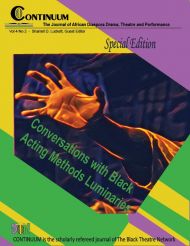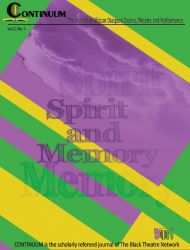Pussy Valley by Katori Hall.
Directed by Nataki Garrett.
Mixed Blood Theatre, Minneapolis
3 May 2015
For thirty-nine seasons, the Mixed Blood Theatre Company has produced plays that reflect its mission of being provocative, inclusive and predictably unpredictable. The theatre company’s mission is exemplified through the staging of Katori Hall’s Pussy Valley. Hall continues her commitment to writing narratives, often marginalized and unseen on the American stage, at the nexus of vulnerability, resilience, and aspirational hope. She illuminates complex female characters and a Southern culture with distinct dialectic rhythms. Deep in the heart of the Mississippi Delta, Pussy Valley’s soundtrack is contemporary Hip-Hop music. But more than musical transitions and pole-dancing accompaniment, the Hip-Hop music reflects the pleasures of material access, struggles of hard choices, and pulsing cadences; the music complements the world of the play.
Pussy Valley is a drama grounded in realism with poetic monologues written in verse—a signature of Hall’s aesthetic. The narrative is a raw and brutal tale that effortlessly finds beauty and admiration in an unconventional place: the Pink Pony strip club. The play centers on five women—four pole dancers: Mercedes (Jasmine Hughes), Miss Mississippi (Joetta Wright), Get ‘em Gidget (Megan Rippey), Autumn Night (Tatiana Williams), and the transgendered owner of the Pink Pony, Uncle Clifford (Nicco Annan). The play reveals an internal view of the Pink Pony beyond performers’ stage names and eroticized dancing. Although pole-dancing clubs can be reduced to sexualized entertainment catering to male consumption, the Pink Pony provides economic opportunities, artistic and acrobatic performance, sisterly camaraderie, and constant gendered power negotiations. The aspirational potential of the Pink Pony is tempered, however, by tough choices, competition, domestic violence, drug use, and murder.
The play begins with the emergence of a new and naïve dancer, Autumn Night, seeking employment at the Pink Pony. Autumn Night’s quick journey from amateur performer to regular pole dancer causes excitement for the Pink Pony’s most notorious patron, an aspiring rapper called Lil’ Murder (Mikell Sapp) and contention with the talented veteran dancer Mercedes, who performs on her own terms. Within the club’s both protective and anonymous environment, Mercedes garners additional revenue performing lap dances and engaging in sex work in the VIP room.
Mercedes’ closest friends are Get ‘em Gidget and Miss Mississippi. Get ‘em Gidget, who chose to pole dance to follow her mother’s legacy, anticipates an upcoming marriage proposal from the club’s regular attendee, Duffy (Dustin Bronson). Miss Mississippi is a single mother in a physically and emotionally abusive relationship, who still performs even after being attacked by the father of her child. Due to lack of support and financial resources, she brings her infant child to the club while she performs.
Hall does not shy away from the gritty circumstances that exploit these women’s vulnerabilities. The owner of the Pink Pony, Uncle Clifford, a compassionate and burly transgendered woman, protects the dancers, but also charges dancing fees that are deducted from their income. While some of the women look forward to leaving this industry, Miss Mississippi unexpectedly decides to enter the porn industry even after the other dancers voice their reservations that, unlike pole dancing, pornography is not art. For her part, Mercedes is threatened by the emergence of her father, Pastor Dollah (James Craven) who pressures her to give him money—money she gained from dancing—to finance the groundbreaking of his church. In another instance, Uncle Clifford is raped by Lil’ Murder and afterwards devastatingly pole dances before he finds solace lying on the floor in the club. Mercedes and Miss Mississippi stop working at the Pink Pony for differing reasons: one by choice and another by force, while Uncle Clifford, Autumn and Get ‘em Gidget remain, further complicating the discourse about why pole dancers stay or exit these employment conditions.
Director Nataki Garrett, associate dean and co-head of Undergraduate Acting at CalArts School of Theatre, mounts a play that grapples with harsh realities and aspirational hope. A strength of this production lies in the spaces of beauty that erupt forcefully through Hall’s verse and Jac Fatale’s choreography. Nathan Schilz’s sound design and Joseph Stanley’s set design reflect an unsettling coupling: the bare set with bright colors filled with the sonic sounds of rap music. Although some acting choices seem forced and, at times, stage blocking lacked creativity, Garrett and the cast—most notably Hughes as Mercedes, Wright as Mississippi and Annan as Uncle Clifford—illuminate how marginalized women confront economic disparity while navigating their own vulnerabilities and fortitude.
The production is an ambitious endeavor that does not conform to traditional aesthetics on beauty. Despite the lack of cohesion among production elements, this play is noteworthy. Coupled with the actors’ athletic and artistic prowess, dialectical nuances, and cathartic impulses that epitomize the intricacies of Southern Mississippi culture, Hall’s dramaturgical complexity is redemptive. These artistic choices counter contemporary “trained” acting conventions, showcasing culture practices that exist distinctively apart from conventional artistic methods.
Pussy Valley is a beautiful and harrowing tale that exemplifies feminist politics’ intersecting oppressions of gender, race, sexualities, class, and ability. The play explicates gender norms and politics of respectability; virtue, exploitation, power, and control are under constant negotiations. This work, in conversation with Hall’s other plays, also shows her commitment to distinctive Black cultures and their unique cadences. The characters’ dialectical rhythms are theatrically nuanced and geographically referential. The play also continues Hall’s literary practice of shining enduring light on complex characters in dark spaces. Her ability to erect pleasure out of peril produces a sophisticated argument about marginalized women that is ultimately redemptive and affirmative. Pussy Valley expands theatrical expectations for its performers and audiences. The hope is that more theatre companies will be as bold and ambitious as Mixed Blood with this endeavor.
Le’Mil L. Eiland
University of Pittsburgh



